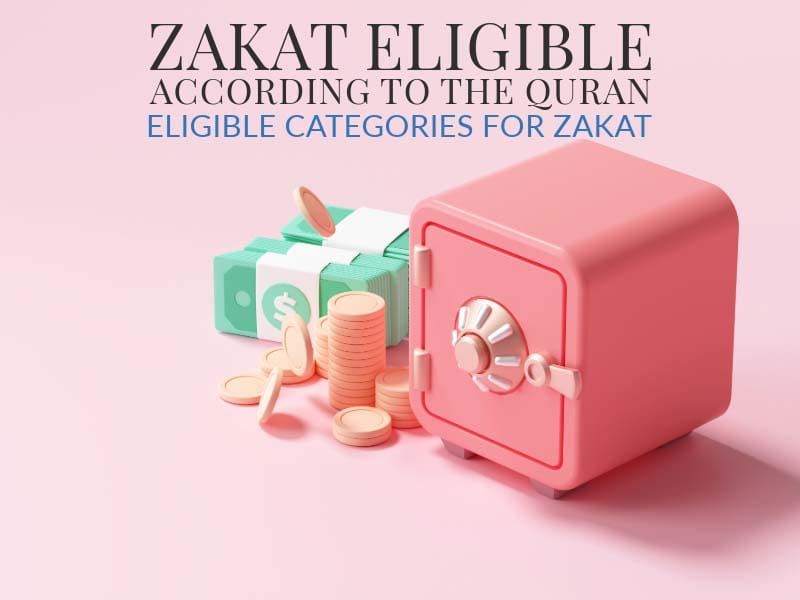Who is zakat eligible? Zakat is an obligatory charity in Islam that gives wealthy Muslims a chance to uplift the poor and needy. It is a chance to help your Muslim brothers and sisters. They are in trouble and need aid during their hardships.
If you are reading this article, then Congratulations! You have been blessed to give away a portion of your earnings in the form of Zakat. But who deserves to get Zakat, and what are the conditions behind it? Let’s read on further to get into the details.
What is Zakat al fitr?
The literal translation of Zakat al fitr is “something that purifies.” It helps to give us a perception that Zakat helps to cleanse our wealth. Zakat al fitr is a form of charity. Muslims must give it away every year. It is compulsory in Islamic law.
Zakat al fitr is important. Our Holy Prophet himself told Muslims about the punishment for those who do not pay it. This is one of many instances. In it, the Prophet (ﷺ) mentions how those who do not pay Zakat will be treated on the day of judgment.
” None among the owners of camels who does not pay their due,” but did not say” their due (Zakat) out of them.” and he make a mention:” He did not miss a single young one out of them.” and he said:” Their sides. their foreheads and their backs would be cauterised.”
(Sahih Muslim 987b)
What is Zakat Al Fitr?
Zakat Al Fitr is a special charity. Muslims must give it to the needy before Eid Prayers. In some parts of the world, this charity is referred to as Fitrana or Fitra. Unlike the former type of Zakat, Zakat ul Fitr is to be paid by every Muslim in the household. Therefore, if a person cannot afford it, the head of the family is liable to pay on their behalf.
Ibn ‘Umar said that the Prophet (ﷺ) prescribed the Sadaqa of Ramadan (Sadaqat-al-Fitr). It is one sa’ of dates or one sa’ of barley for every free man or a slave, male or female. Then, the people made (one sa’ of dates or barley) equal to half a sa’ of wheat.
(Sahih Muslim 984c)
Who is zakat eligible according to Quran?
The basic requirement for a Muslim who wants to give Zakat is that they must be adults and possess a sane mind. After this, they must own wealth in a certain form and the amount for this possession must be over the Nisab.
A person with any worldly possession, like Gold, Silver, Land, or Cash, that is over the Nisab must pay 2.5% of its value. Eligible Muslims must pay off their Zakat on an annual basis. You can calculate your Zakat simply. Just find the cash value of all your things and take 2.5% of its value.
Also, there are many online Zakat calculators. They can simplify the task for you. Most Muslims like to pay their Zakat in Ramadan. They believe it doubles the reward.
Who Is Eligible to Receive Zakat?
Paying off your Zakat is important. Allah stated the eight types of people who can receive it. In Surah At-Tawbah, Allah says,
The Sadaqah (prescribed alms) are only for the poor and needy. They are also for those employed to collect them and for those whose hearts are to be won. They are for the cause of the slaves and those encumbered with debt. They are for the way of Allah and for a wayfarer. This is an obligation prescribed by Allah. Allah is All-Knowing, Wise.”
[Surah At- Tawbah 9:60]
We can assess the Quranic verse. It says that eight types of Muslims are eligible for Zakat.
1. Al-Fuqara or the Poor
They are very poor. They live hand-to-mouth. These people do not have any possessions or income. The zakat that we give to them can improve their living conditions. You can also say that these people are living below the poverty belt.
2. Al Masakin or the Needy
They are not self-sufficient. They do not earn enough to support themselves or their dependents. They do not have any savings or even a running business. Such people require support from other Muslims to live their lives.
3. The Aamileen or Zakat Collectors/ Administrators
People in this category have the authority to collect, keep, and give away the Zakat money. These people can also receive a portion of the Zakat money as per the efforts that they put in for the purpose.
4. Muallafatul Quloob or Those Whose Hearts Can Be Reconciled
This category includes recent converts to Islam and friends of the Muslim community. It helps such people to bring their hearts closer to Islam and increase their faith. Also, giving them enough money can stop them from turning to crime.
5. Ar-Riqaab or the Slaves
Zakat can be given to the slaves or captives to free them from bondage. It also includes those Muslims who are captured by the enemy and require a certain amount to be freed.
6. Al-Gharimeen or the Debt Ridden
This category includes people who carry a burden of debt. They cannot pay it off without help from others. The individuals can use Zakat to get rid of this amount. Another option is to use the amount to pay off the debt directly. This stops the person he owes from using it for anything else.
7. Fi-Sabeelillah or For Allah’s Cause
This category includes any Muslim who is working hard to spread the word of Allah. They are also spreading the teachings of the Quran and Sunnah. It also includes Jihadis, stranded Haji, or those who are seeking the knowledge of Islam.
8. Ibnus Sabeel or The Travellers
This category includes any traveler who is stuck in the middle of the journey due to a lack of resources. They must only use the amount for the trip and cost. They must not spend it on extra things during the journey.
Zakat an important practice in Islam
Zakat is an important practice in Islam. It has many purposes and economic impacts. Let’s explore some of these:
- Purification of Wealth: Allah encourages giving Zakat. It purifies the wealth and the giver. This act is a way of cleansing and increasing one’s blessings.
- Promoting Kindness and Solidarity: Zakat fosters kindness and solidarity among people. It provides charity and support. They don’t cause hardship. They help meet the needs of the less fortunate. They aid debtors and ensure stability and security in society.
- Giving Zakat is linked to the growth of the payer’s wealth. Allah rewards those who fulfill this duty by destroying usury and increasing charity.
- Zakat helps economic growth. It moves wealth within society and stops it from piling up with the rich. This demand leads to more goods and services. It causes higher production and more jobs.
- Zakat encourages using resources well. It motivates merchants to exchange their wealth. This prevents it from diminishing.
Now, let’s briefly discuss the conditions for Zakat obligation:
- Islam: Zakat is obligatory for Muslims, as commanded by Allah to the Prophet Muhammad (ﷺ).
- The wealth subject to Zakat must be owned by a person or group. They must have stable and established ownership and the ability to grow the wealth.
- Nissâb: Zakat becomes due when the wealth reaches a certain minimum amount, known as Nissâb.
- Zakat is due only if a full lunar year has passed since the wealth became stable and reached the Nissâb.
Lastly, Zakat’s impact depends on the condition of the elapse of a full lunar year. This considers public interest to ensure that it does not harm the public or collectors. You can delay or pay Zakat early. Consider the community’s needs and the situation.
Zakat calculation methods
The Zakat, Tax, and Customs Authority calculates Zakat using two methods. They are the direct and indirect methods.
Direct Method of Calculating Zakat:
- This method involves counting zakatable assets. You then subtract liabilities to find the Zakat base.
- The equation for this method is: Zakat Base equals Assets minus Liabilities.
- It is suitable for individuals and voluntary institutions due to its simplicity and clarity.
- Not recommended for mandatory Zakat collection by entities.
Indirect Method of Calculating Zakat:
- It is also called the finance sources method. It involves finding the equity used in zakatable assets.
- The equation is: Zakat Base equals Internal Wealth Sources plus External Wealth Sources. It equals as much as used in Deducted Assets. This is minus Non-Zakatable Assets and Zakatable Assets.
- This method is used in Saudi Arabia. It is good for mandatory Zakat collection.
- It helps verify data accuracy. It tracks information and reduces Zakat evasion.
Both methods help collect and manage Zakat. They ensure fairness and Islamic adherence.
Conclusion
The main goal of Zakat is to remind Muslims that they are more than just materialistic. Zakat is the third pillar of Islam. There are strict punishments for those who do not pay it and hoard wealth. If anyone wants to purify their spirit, they must give their Zakat to the people who truly deserve it. This will cleanse their health and wealth.

